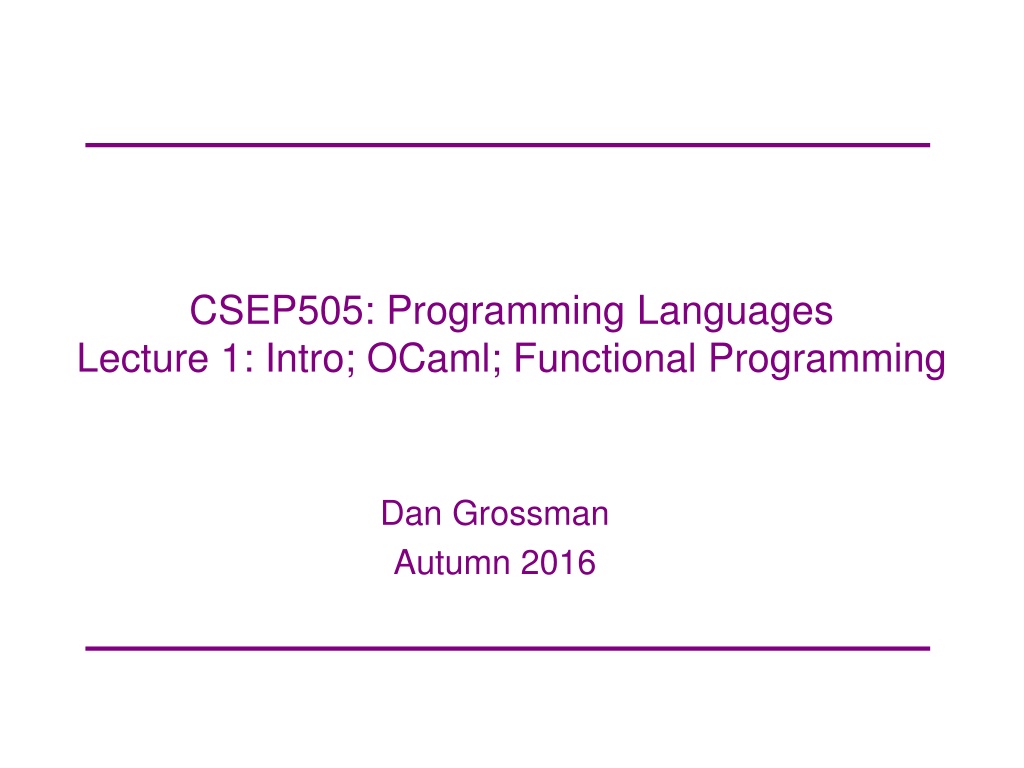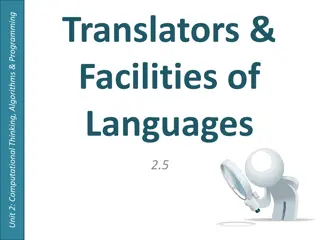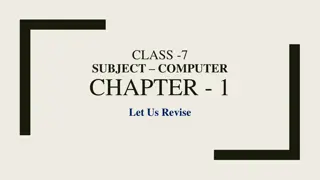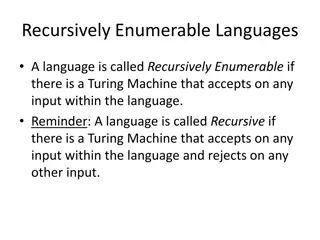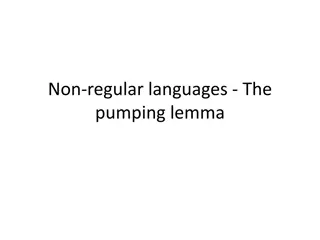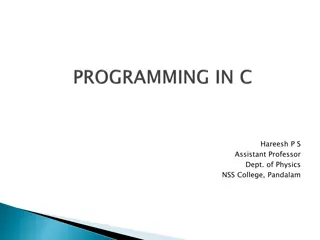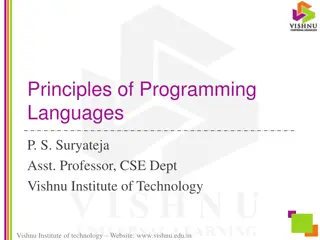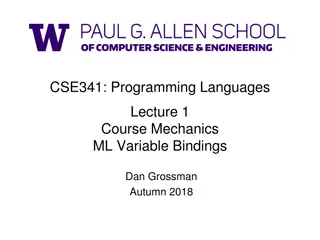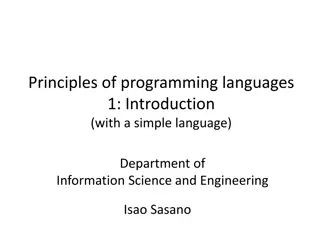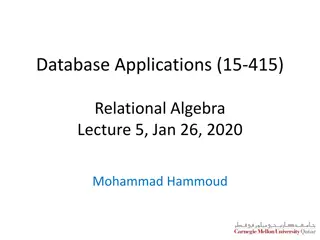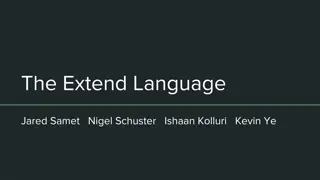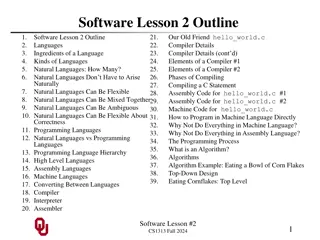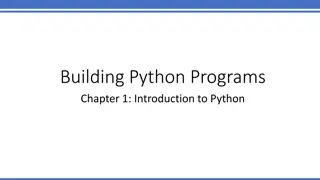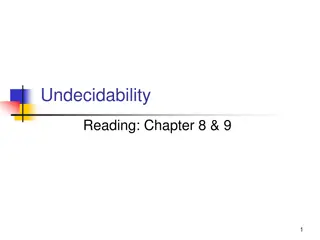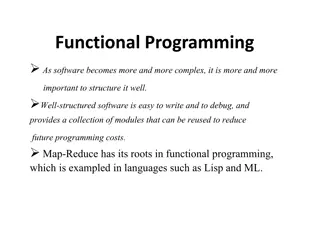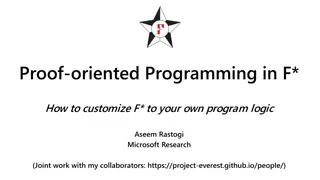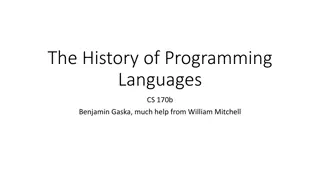Introduction to Programming Languages and Functional Programming with OCaml
Welcome to Lecture 1 of CSEP505 on Programming Languages focusing on OCaml and functional programming. Professor Dan Grossman introduces the course, discusses the importance of studying programming languages, and shares insights on course mechanics and content. Topics include staff introductions, course structure, and resources. Emphasis is placed on foundational concepts, homework assignments, and a take-home final exam. Students are encouraged to explore the course webpage for syllabus, advice, and programming resources.
Download Presentation

Please find below an Image/Link to download the presentation.
The content on the website is provided AS IS for your information and personal use only. It may not be sold, licensed, or shared on other websites without obtaining consent from the author. Download presentation by click this link. If you encounter any issues during the download, it is possible that the publisher has removed the file from their server.
E N D
Presentation Transcript
CSEP505: Programming Languages Lecture 1: Intro; OCaml; Functional Programming Dan Grossman Autumn 2016
Welcome! 10 weeks for key programming-language concepts Focus on the universal foundations Today: 1. 2. 3. Staff introduction; course mechanics Why and how to study programming languages OCaml and functional-programming tutorial Lecture 1 CSE P505 Autumn 2016 Dan Grossman 2
Hello, my name is Dan Grossman, djg@cs Faculty member researching programming languages Sometimes theory (math) Sometimes implementation (graphs) Sometimes design (important but hand-waving) Particularly, safe low-level languages, easier-to-use concurrency, better type-checkers, other Approximately 0 years professional experience... but I ve done a lot of compiler hacking Father of two boys < 3 years old Lecture 1 CSE P505 Autumn 2016 Dan Grossman 3
Course facts (overview) http://courses.cs.washington.edu/courses/csep505/16au/ TA: John Toman, Ph.D. student advised by me Pre-course survey Homework 0 and Homework 1 No textbook 5 homeworks OCaml/F#/Haskell Take-home final exam much later Then onto actual course motivation and content Lecture 1 CSE P505 Autumn 2016 Dan Grossman 4
Course web page Read syllabus includes some advice Read advice for approaching homework Homework code is not industry code Functional programming is not imperative/OOP Course web page will have slides, code, homework, programming resources, etc. Lecture 1 CSE P505 Autumn 2016 Dan Grossman 5
TA John Knows his stuff In general, email both of us with questions to reduce latency John will do the grading ? Lecture 1 CSE P505 Autumn 2016 Dan Grossman 6
Survey An optional, brief and extremely useful survey On the web page (Google form) Things like what you do and what your concerns are (Also helps me learn your names) Lecture 1 CSE P505 Autumn 2016 Dan Grossman 7
Homework 0 Install software, edit file, compile, run Not worth any points, but highly recommended before next week Lecture 1 CSE P505 Autumn 2016 Dan Grossman 8
Homework 1 A real homework Due in 2 weeks Will generally do every-other-week because Life. Encourage you to start for real before next week. Lecture 1 CSE P505 Autumn 2016 Dan Grossman 9
Wide background Homework 1 will likely demonstrate a wide range of background So some material will be simultaneously too remedial and too advanced Still let me know (politely ) Challenge problems help some Affect your grade, but only a little Speaking of background, no need for PMP/5th-year mutual fear Lecture 1 CSE P505 Autumn 2016 Dan Grossman 10
Segue to a sermon I m here to teach the essential beauty of the foundations of programming languages If you re here because The other courses looked even worse You can get out of the house on Thursday nights A Master s degree will get you a raise then you risk taking longcuts and being miserable Advice: If you must be <100% engaged, try to wait as long as possible the material builds more than it seems Catching up is hard Lecture 1 CSE P505 Autumn 2016 Dan Grossman 11
No textbook There just isn t a book that covers this stuff well And the classic research papers are too old to be readable Pierce book: Very good, with about 25% overlap with the course Many undergraduate-level books, none of which I ve used or liked O Reilly book on OCaml is free (in English) Will post relevant recent papers as interesting optional reading (rarely good for learning material) I do have videos from 2009, but I plan to change ~30% and I ve learned a lot since then Lecture 1 CSE P505 Autumn 2016 Dan Grossman 12
Homework 5 assignments Mostly OCaml/F# programming (some written answers) Probably one in Haskell Expect to learn as you do them Not a lot of lines Again, challenge problems are optional Do your own work, but feel free to discuss Do not look at other s solutions But learning from each other is great OCaml vs. F# See also lots of detail on web page Lecture 1 CSE P505 Autumn 2016 Dan Grossman 13
Final exam Please do not panic about taking an exam Worth 2/7 of the course grade (2x 1 homework) Why an exam? Helps you learn material as the course goes on Helps you learn material as you study for it I ll post a sample [much] later Lecture 1 CSE P505 Autumn 2016 Dan Grossman 14
OCaml OCaml is an awesome, high-level language We ll use a small core subset that is well-suited to manipulating recursive data structures (like programs) Tutorial will demonstrate its mostly functional nature Most data immutable Recursion instead of loops Lots of passing/returning functions Again, will support F# as a fine alternative Lecture 1 CSE P505 Autumn 2016 Dan Grossman 15
Welcome! 10 weeks for key programming-language concepts Focus on the universal foundations Today: 1. 2. 3. Staff introduction; course mechanics Why and how to study programming languages OCaml and functional-programming tutorial Lecture 1 CSE P505 Autumn 2016 Dan Grossman 16
A question What s the best kind of car? What s the best kind of shoes? Lecture 1 CSE P505 Autumn 2016 Dan Grossman 17
An answer Of course it depends on what you are doing Programming languages have many goals, including making it easy in your domain to: Write correct code Write fast code Write code fast Write large projects Interoperate Lecture 1 CSE P505 Autumn 2016 Dan Grossman 18
Another question Aren t all cars the same? 4 wheels, a steering wheel, a brake the rest is unimportant details Standards help Easy to build roads and rent a car But legacy issues dominate Why are cars the width they are? Lecture 1 CSE P505 Autumn 2016 Dan Grossman 19
Arent all PLs the same? Almost every language is the same You can write any function from bit-string to bit-string (including non-termination) All it takes is one loop and two infinitely-large integers Called the Turing tarpit Yes: Certain fundamentals appear almost everywhere (variables, abstraction, records, recursive definitions) Travel to learn more about where you re from OCaml lets these essentials shine Like the DEC Alpha in computer architecture No: Real differences at formal and informal levels Lecture 1 CSE P505 Autumn 2016 Dan Grossman 20
Picking a language Admittedly, semantics can be far down the priority list: What libraries are available? What do management, clients want? What is the de facto industry standard? What does my team already know? Who will I be able to recruit? But: Nice thing about class: we get to ignore all that Technology leaders affect the answers Sound reasoning about programs requires semantics Mission-critical code doesn t seem to be right Blame: the compiler vendor or you? Lecture 1 CSE P505 Autumn 2016 Dan Grossman 21
And some stuff is just cool We certainly should connect the theory in this course to real- world programming issues Though maybe more later in the course after the basics But even if we don t, some truths are so beautiful and perspective-altering they are worth learning anyway Watching Hamlet should affect you Maybe very indirectly Maybe much later And maybe you need to re-watch it Lecture 1 CSE P505 Autumn 2016 Dan Grossman 22
Academic languages Aren t academic languages worthless? Yes: fewer jobs, less tool support, etc. But a lot has changed in the last decade No: Knowing them makes you a better programmer Java did not exist in 1993; what doesn t exist now Eventual vindication (on the leading edge): garbage-collection, generics, function closures, iterators, universal data format, (what s next?) We don t conquer; we assimilate And get no credit (fine by me) Functional programming is finally cool -ish Lecture 1 CSE P505 Autumn 2016 Dan Grossman 23
But I dont do languages Aren t languages somebody else s problem? If you design an extensible software system or a non-trivial API, you'll end up designing a (small?) programming language! Another view: A language is an API with few functions but sophisticated data. Conversely, an interface is just a stupid programming language Lecture 1 CSE P505 Autumn 2016 Dan Grossman 24
Our API type source_prog type object_prog type answer val evaluate : source_prog -> answer val typecheck : source_prog -> bool val translate : source_prog -> object_prog 90+% of the course is defining this interface It is difficult but really elegant (core computer science) Lecture 1 CSE P505 Autumn 2016 Dan Grossman 25
Summary so far We will study the definition of programming languages very precisely, because it matters There is no best language, but lots of similarities among languages Academic languages make this study easier and more forward-looking A good language is not always the right language but we will pretend it is APIs evolve into programming languages Learn to specify all your corner cases via elegant composition Lecture 1 CSE P505 Autumn 2016 Dan Grossman 26
Last Motivation: Fan Mail Today I had to do some work with a minimal browser shell around Internet Explorer (for work), and found that I didn't have my usual Javascript debugging tools. So I tried to write a small "immediate window" for Javascript so I could conveniently execute commands. I started off knowing I'd probably use some eval(), but only a little while in, I realized the naive approach wasn't going to work, because eval() does its evaluation in the current context [snip] I eventually got it to work using some eval tricks and some closure tricks. I am 100% sure that if I had not taken your mind-bending class, there's no way I could have figured this out, so I wanted to share it with you. Lecture 1 CSE P505 Autumn 2016 Dan Grossman 27
Last Motivation: Fan Mail I was starting my first week at Google, all fresh-faced and eager to impress. As a the newest employee on the team, my co-workers gave me the task of sanity-checking the newly written Dart language spec (and it would be a good way to introduce me to the language). The specification was filled with operational and denotational semantics, and thanks to what I learned in 505 I was able to reasonably easily read through the document and get up to speed on Dart! Lecture 1 CSE P505 Autumn 2016 Dan Grossman 28
Last Motivation: Fan Mail Hi Dan, I've been meaning to get around to doing this, but I wanted to tell you about the impact that your class had on me when I took it back in 2008. I'm not exaggerating when I say that I've been digesting it for the last six years and I've gone through the course notes at least once a year. I continue to learn more and more as time goes on. The one thing I'd say is that it is immediately clear when you enter industry that there are two types of programmers - ones that have a basic understanding of PL fundamentals and ones that do not. The conversations you'd have with each of these types are extremely different. If someone lacks a basic understanding of PL, they're much more likely to dogmatically adhere to patterns and practices that are suboptimal or, more typically, just don't matter that much. Lecture 1 CSE P505 Autumn 2016 Dan Grossman 29
Last Motivation: Fan Mail Long time, no see ;) I figured I'd drop you a line about the latest project I've been working on for a few months: [snip]. I took [snip] and added a streaming SQL layer on top. Finally, a chance to apply my hard-won 505 knowledge to something out here in the so-called "real world." I even had to pull out the Pierce book at one point. Lecture 1 CSE P505 Autumn 2016 Dan Grossman 30
Last Motivation: Fan Mail I also wanted to mention that even though I was against the idea of an exam before the quarter started, I thought your exam was fair and even fun. It was stressful to study for, but I'm hopeful that the concepts have sunk in better now than if I hadn't studied. Lecture 1 CSE P505 Autumn 2016 Dan Grossman 31
Last Motivation: Fan Mail Dan, I just wanted to thank you for a truly mind-stretching semester. I enjoyed it a lot; it was worth every penny (out of my own pocket). You've given me insight and perspective on so many things. I've even been caught twice now by my colleagues, speaking in terms of, "well, that would depend on the intended semantics of the programming language". : ) Lecture 1 CSE P505 Autumn 2016 Dan Grossman 32
Last Motivation: Fan Mail I just came across continuations by accident while I was looking at comparisons of lua with other languages. I completely forgot we had gone over those in your class, and am beating myself up for not using them *ALL THE TIME* in my code - they are awesome! Why are languages the coolest?! Lecture 1 CSE P505 Autumn 2016 Dan Grossman 33
Last Motivation: Fan Mail This class has changed the way I think about programming - even if I don t get to use all of the concepts we explored in OCaml (I work in C++ most of the time), understanding more of the theory makes a tremendous difference to how I go about solving a problem. Lecture 1 CSE P505 Autumn 2016 Dan Grossman 34
Welcome! 10 weeks for key programming-language concepts Focus on the universal foundations Today: 1. 2. 3. Staff introduction; course mechanics Why and how to study programming languages OCaml and functional-programming tutorial Lecture 1 CSE P505 Autumn 2016 Dan Grossman 35
And now OCaml Hello, World , compiling, running, etc. Demo Tutorial on the language Mostly via demo but slides has similar/identical code Heavily skewed toward what we need to study PL Then use our new language to learn Functional programming Idioms using higher-order functions Benefits of not mutating variables Then use OCaml to define other (made-up) languages Probably next week? Lecture 1 CSE P505 Autumn 2016 Dan Grossman 36
Advice Listen to how I describe the language Let go of what you know: do not try to relate everything back to YFL (We ll have plenty of time for that later) Lecture 1 CSE P505 Autumn 2016 Dan Grossman 37
Hello, World! (* our first program *) let x = print_string Hello, World!\n A program is a sequence of bindings One kind of binding is a variable binding Evaluation evaluates bindings in order To evaluate a variable binding: Evaluate the expression (right of =) in the environment created by the previous bindings This produces a value Extend the (top-level) environment, binding the variable to the value Lecture 1 CSE P505 Autumn 2016 Dan Grossman 38
Some variations let x = print_string Hello, World!\n (*same as previous with nothing bound to ()*) let _ = print_string Hello, World!\n (*same w/ variables and infix concat function*) let h = Hello, let w = World!\n let _ = print_string (h ^ w) (*function f: ignores its argument & prints*) let f x = print_string (h ^ w) (*so these both print (call is juxtapose)*) let y1 = f 37 let y2 = f f (* pass function itself *) (*but this does not - y1 bound to () *) let y3 = y1 Lecture 1 CSE P505 Autumn 2016 Dan Grossman 39
Compiling/running compile to bytecodes (put in executable) ocamlc file.ml compile to native (1-5x faster, no need in class) ocamlopt file.ml print types of all top-level bindings (an interface) ocamlc i file.ml read-eval-print loop (see manual for directives) ocaml see the manual (probably unnecessary) ocamlprof, ocamldebug, Later today(?): multiple files Lecture 1 CSE P505 Autumn 2016 Dan Grossman 40
Installing, learning Links from the web page: P505-specific instructions www.ocaml.org The on-line manual (fine reference) An on-line book (less of a reference) Contact us with install problems soon! Ask questions (we know the language, want to share) But 100 rapid-fire questions not the way to learn Lecture 1 CSE P505 Autumn 2016 Dan Grossman 41
Types Every expression has a type. So far: int string unit t1->t2 a (* print_string : string->unit, : string *) let x = print_string Hello, World!\n (* x: unit *) (* ^ : string->string->string *) let f x = print_string (h ^ w)(* f : a -> unit *) let y1 = f 37 (* y1 : unit *) let y2 = f f (* y2 : unit *) let y3 = y1 (* y3 : unit *) Lecture 1 CSE P505 Autumn 2016 Dan Grossman 42
Explicit types You (almost) never need to write down types But can help debug or document Can also constrain callers, e.g.: let f x = print_string (h ^ w) let g (x:int) = f x let _ = g 37 let _ = g hi (*no typecheck, but f hi does*) Lecture 1 CSE P505 Autumn 2016 Dan Grossman 43
Theory break Some terminology and pedantry to serve us well: Expressions are evaluated in an environment An environment maps variables to values Expressions are type-checked in a context A context maps variables to types Values are integers, strings, function-closures, things already evaluated Constructs have evaluation rules (except values) and type- checking rules Lecture 1 CSE P505 Autumn 2016 Dan Grossman 44
Recursion A let binding is not in scope for its expression, so: let rec (*smallest infinite loop*) let rec forever x = forever x (*factorial (if x>=0, parens necessary)*) let rec fact x = if x==0 then 1 else x * (fact(x-1)) (*everything an expression, eg, if-then-else*) let fact2 x = (if x==0 then 1 else x * (fact(x-1))) * 2 / 2 Lecture 1 CSE P505 Autumn 2016 Dan Grossman 45
Locals Local variables and functions much like top-level ones with in keyword (optional in F#) let quadruple x = let double y = y + y in let ans = double x + double x in ans let _ = print_string((string_of_int(quadruple 7))^ \n ) Lecture 1 CSE P505 Autumn 2016 Dan Grossman 46
Anonymous functions Functions need not be bound to names In fact we can desugar what we have been doing Anonymous functions cannot be recursive let quadruple2 x = (fun x -> x + x) x + (fun x -> x + x) x let quadruple3 x = let double = fun x -> x + x in double x + double x Lecture 1 CSE P505 Autumn 2016 Dan Grossman 47
Passing functions (* without sharing (shame) *) print_string((string_of_int(quadruple 7))^ \n ); print_string((string_of_int(quadruple2 7))^ \n ); print_string((string_of_int(quadruple3 7))^ \n ) (* with boring sharing (fine here) *) let print_i_nl i = print_string ((string_of_int i)^ \n ) let _ = print_i_nl (quadruple 7); print_i_nl (quadruple2 7); print_i_nl (quadruple3 7) (* passing functions instead *) (*note 2-args and useful but unused polymorphism*) let print_i_nl2 i f = print_i_nl (f i) let _ = print_i_nl2 7 quadruple ; print_i_nl2 7 quadruple2; print_i_nl2 7 quadruple3 Lecture 1 CSE P505 Autumn 2016 Dan Grossman 48
Multiple args, currying let print_i_nl2 i f = print_i_nl (f i) Inferior style (fine, but OCaml novice): let print_on_seven f = print_i_nl2 7 f Partial application (elegant and addictive): let print_on_seven = print_i_nl2 7 Makes no difference to callers: let _ = print_on_seven quadruple ; print_on_seven quadruple2; print_on_seven quadruple3 Lecture 1 CSE P505 Autumn 2016 Dan Grossman 49
Currying exposed (* 2 ways to write the same thing *) let print_i_nl2 i f = print_i_nl (f i) let print_i_nl2 = fun i -> (fun f -> print_i_nl (f i)) (*print_i_nl2 : (int -> ((int -> int) -> unit)) i.e., (int -> (int -> int) -> unit) *) (* 2 ways to write the same thing *) print_i_nl2 7 quadruple (print_i_nl2 7) quadruple Lecture 1 CSE P505 Autumn 2016 Dan Grossman 50
